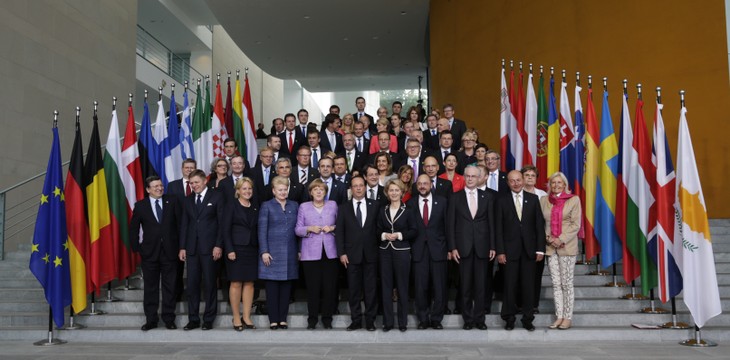(VOVworld) – Europe has faced instability and challenges in 2015 – security threats, slow economic recovery, and divisions provoked by a growing migration crisis.

The Council of the European Union |
Crises in Europe cause instability that spreads beyond the continent. President of the European Parliament Martin Schulz said 2015 has been a year that started with terror and is ending with terror. A year shaped by fear and deep crises in the economic and social spheres as well as in the labour market, and by a division of European member states never seen before, Martin said.
A year of terror attacks and migration crisis
Terrorism and massive migration have been the two biggest threats in Europe since World War II.
France has been the target of two terror attacks that shocked the world. Since the attack on the Charlie Hebdo journal office in Paris early this year, France and other EU countries have been on high alert. Then Europe was shaken by organized terror attacks on November 13 in Paris that killed over 100 people. New security measures have been imposed in Europe, including the suspension of the Schengen agreement on visa-free travel, a symbol of democracy and freedom. EU member countries have agreed to apply the Passenger Name Record (PNR) system despite concerns over personal information leaks. Border security within the EU has been tightened.
Long-term social stability, the most important factor in preventing terrorism, has been disrupted by the biggest migration to Europe in the 21st century. Migrants from Syria, Iraq, and Afghanistan have been pouring into Europe. The International Organization for Migration (IOM) estimates that migrants to Europe by sea and land this year have exceeded 1 million people, 4 times the number in 2014.
At the EU year-end summit on December 17-18, member countries failed to reach any long-term agreement to resolve the crisis.
The EU is divided
The EU was on the brink of division in dealing with the Greek debt crisis. The migration crisis in 2015 has further threatened the bloc’s unity. Member countries must choose between supporting the migrants or tightening security to protect themselves. Hungary, Slovakia, and Poland have resisted EU migrant quotas and reallocation of migrants. Some countries, including Germany, the most powerful advocate of hosting migrants, have tried to push the migrants away from the EU border. Migrants have imposed economic, security, and social burdens, caused religious and sectarian division, and threatened the power of the ruling parties as an exasperated public begins to lean toward xenophobic, far-right parties.
Unrecovered economy
The global financial crisis of 2008 and the public debt crisis in Europe haven’t gone away and continue to hamper economic recovery. Greece and Italy have suffered from severe public debt, slow reform, and a continuing austerity policy. Some countries have placed budget discipline below terrorism. France has decided to invest more in security and couldn’t deliver its EU promise of keeping its budget deficit below 3% of GDP in 2017. Some countries have been unable to hit their inflation targets due to a suspension of agriculture exports to Russia and reciprocal economic sanctions between the EU and Russia.
2016: more challenges
Observers say the economic crisis in Greece and Italy will lead to higher unemployment and debts, the migrant crisis will be exacerbated by new terrorist plots, and EU countries will be challenged to find common ground and keep the UK from leaving the Union.